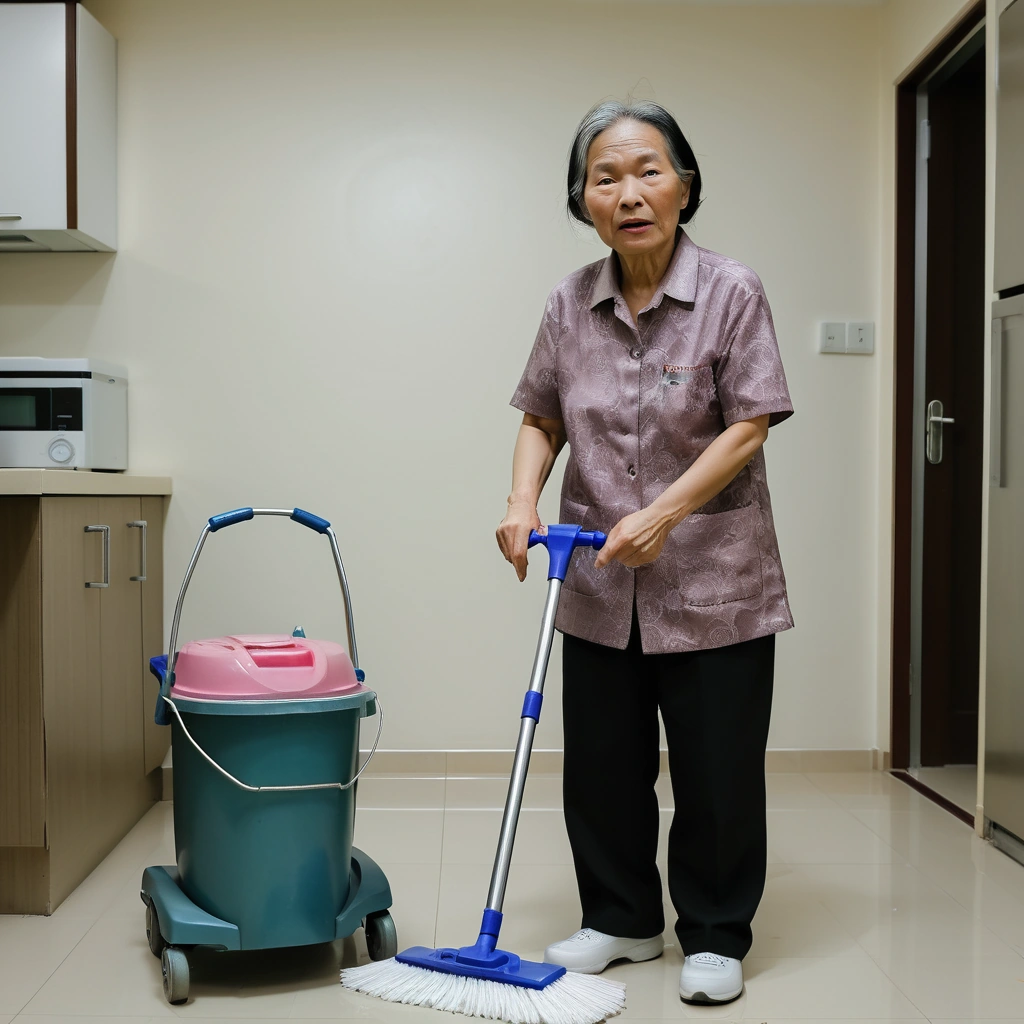Too Old for Hong Kong? The Real Age Limit for Domestic Helpers
“Sorry, you’re 45 already? Hong Kong employers want younger.” That crushing statement from recruitment agencies destroys the dreams of thousands of experienced domestic helpers every year. But here’s what agencies won’t tell you: there’s NO legal age limit for Hong Kong domestic helpers. That 45-year-old who got rejected might deploy next month while a 28-year-old waits forever. This guide reveals the actual age discrimination happening, which employers still hire older helpers, and how experienced DHs successfully deploy to Hong Kong despite being “too old” according to agencies.
The brutal truth about Hong Kong’s domestic helper market is that age discrimination is illegal but happens every single day. Employers openly tell agencies “below 35 only” or “no one over 40” and nobody stops them. Immigration doesn’t care if you’re 25 or 55 – they’ll approve your visa if documents are complete. But between Immigration approval and employer acceptance lies a massive gap that older helpers must navigate strategically.
The Legal Truth vs Market Reality About Age
Let’s be crystal clear about what’s legal versus what actually happens in Hong Kong’s helper hiring market.
Legally, there’s ZERO age limit for domestic helpers in Hong Kong. Immigration law doesn’t specify maximum age. The Labour Department prohibits age discrimination in employment. You can be 55, 60, even 65 and still get a helper visa if you pass medical requirements and have an employer. Any agency saying “Hong Kong doesn’t accept over 45” is lying.
The oldest helper I know is 67 years old – still working, still renewing her contract yearly. She started at age 52 with an elderly employer who wanted mature care. Fifteen years later, she’s still there. Immigration renews her visa without question. Her secret? She found the right employer who values experience over youth.
But market reality is harsh: 80% of first-time employers want helpers aged 25-35. They assume younger means more energy, easier to train, and less health problems. Chinese employers particularly prefer younger helpers for “face” – having a young helper suggests wealth and status. Western employers care less about age but represent only 5% of the market.
Agencies perpetuate age discrimination because younger helpers are easier to place. Why work hard finding employers for 45-year-olds when 25-year-olds get hired immediately? Agencies make the same commission regardless. So they reject older applicants claiming “Hong Kong age limit” rather than admit they’re too lazy to find age-appropriate employers.
The COVID effect made things worse – employers now assume older helpers have more health risks. Never mind that fit 45-year-olds are healthier than overweight 25-year-olds. The perception that older equals vulnerable became embedded after 2020, making age discrimination even more prevalent.
The Magic Numbers: Age Brackets That Matter
Understanding how employers categorize helpers by age helps you position yourself strategically.
Ages 25-30: The “Golden Age” for first-time deployment. Employers assume you’re energetic, adaptable, and without family complications. You’ll handle young children, learn quickly, and accept any arrangement. Agencies actively recruit this age group. If you’re 29, deploy NOW before hitting 30 – that single year makes a difference.
Ages 31-35: Still Desirable but questions arise. Employers wonder why you’re not married or why you’re leaving children behind. Emphasize your maturity and stability. Many employers actually prefer early 30s for infant care – old enough for experience, young enough for night duties.
Ages 36-40: The Transition Zone where discrimination begins. First-time deployment gets harder. Agencies suggest lying about age (don’t – Immigration checks). But experienced helpers in this bracket do well with contract renewals and transfers. Employers who’ve had 38-year-old helpers often prefer that age for reliability.
Ages 41-45: The Discrimination Wall where agencies start rejecting outright. “Too old for Hong Kong” becomes the standard response. But here’s the secret: employers seeking elderly care specifically want this age group. A 42-year-old understands arthritis pain better than a 25-year-old. Market yourself for elderly care, not general housework.
Ages 46-50: The “Invisible” Years where agencies won’t even process applications. They claim employers won’t accept you. But direct-hire employers on Facebook groups regularly seek experienced helpers this age. Skip agencies entirely – they won’t help you. Go direct or through NGO placement programs.
Ages 51+: The “Impossible” Category according to agencies. But hundreds of helpers over 50 work in Hong Kong. They found specific employers wanting maturity: elderly couples, single professionals, or families with special needs children. Your age becomes an advantage with right positioning.
Why Employers Actually Want Older Helpers (But Agencies Won’t Tell You)
Certain employers specifically seek older helpers, but agencies don’t bother matching them with older applicants.
Elderly employers want peers, not kids taking care of them. A 70-year-old couple doesn’t want a 25-year-old who can’t relate to aging challenges. They want someone who understands medication schedules, mobility limitations, and dignity in personal care. Your 45+ years of life experience matters more than youthful energy.
Single male employers prefer older helpers to avoid gossip and complications. A 50-year-old banker doesn’t want neighbors assuming improper relationships with young helpers. Older helpers provide professionalism without drama. Many specifically request “mature” helpers for this reason.
Families with special needs children value emotional maturity over physical strength. A 45-year-old who raised her own children understands patience better than eager 25-year-olds. Autism, ADHD, and developmental delays require wisdom, not just energy. Your parenting experience becomes your qualification.
Orthodox Jewish families often prefer older helpers for religious reasons. Modesty laws make them uncomfortable with young women in their homes. Mature helpers respect religious boundaries better. This niche market specifically seeks 40+ aged helpers.
Experienced expatriate families who’ve had multiple helpers know that age brings stability. They’re tired of training young helpers who break contracts for better offers. A 43-year-old who needs stable employment for children’s college won’t job-hop like 25-year-olds chasing higher salaries.
The Medical Exam: Where Age Discrimination Gets Real
Your age affects medical exam results, and certain conditions automatically increase with age. Understanding this helps you prepare or accept limitations.
Blood pressure rises with age – that’s biological fact. At 25, your 120/80 reading comes naturally. At 45, maintaining below 140/90 requires effort. Start blood pressure management three months before medical exam. Many 45+ helpers fail first medical but pass after medication adjustment.
Blood sugar creeps higher even without diabetes. Pre-diabetes affects 40% of people over 45. Your fasting glucose might read 115 mg/dL – not diabetic but “borderline.” Hong Kong accepts controlled diabetes with medication, but employers might reject you anyway. Get tested early and manage with diet if needed.
Arthritis and joint problems show on X-rays even without symptoms. That knee pain from years of housework might appear as “degenerative changes” scaring employers about future medical costs. Get orthopedic clearance stating you’re fit for domestic work despite age-related changes.
Menopause complications affect 45-55 year olds. Hot flashes, mood changes, and irregular periods might concern employers about reliability. Some helpers take hormone replacement therapy to manage symptoms. Don’t hide menopause – explain it’s temporary and manageable.
Dental problems accumulate and Hong Kong employers won’t pay for dental care. Missing teeth or obvious decay suggests poverty and poor self-care. Invest in dental work before deployment. Employers judge appearance harshly, and dental problems age you dramatically.
How to Look Younger (Without Lying About Your Age)
Since age discrimination is real, presenting yourself younger helps without falsifying documents.
Hair color matters enormously – gray hair adds 10 years instantly. Dye your hair naturally black or dark brown, not jet black (looks fake). Maintain roots every 3 weeks. Hong Kong has Filipino salons in Central doing touch-ups for HKD 200. Budget this as necessary expense, not vanity.
Weight affects age perception more than actual years. A fit 45-year-old looks younger than overweight 30-year-old. Lose weight before deployment if needed. Employers assume overweight means lazy and unhealthy. Harsh but true. Even 10 pounds makes huge difference in photos and interviews.
Clothing choices age or youth-ify you. Avoid “tita” fashion – loose floral blouses, baggy pants, obvious comfort shoes. Wear fitted but modest clothing in solid colors. Update your style watching what 35-year-old office workers wear, not what’s comfortable. First impressions determine employer interest.
Smartphone skills suggest youth. Mention WhatsApp, Instagram, and video calling capabilities. Employers assume older helpers are technology-challenged. Show them your smartphone, mention helping previous employers with devices. Technology comfort reduces age concerns.
Energy demonstration beats age numbers. During interviews, sit straight, speak clearly, move quickly. Don’t mention tired feelings or health problems. When asked about handling children, emphasize your energy and experience. Show enthusiasm even if you’re exhausted. Employers fear older means slower.
The Facebook Strategy for Older Helpers
Since agencies won’t help, Facebook becomes your primary job-hunting tool. But posting requires strategy for older applicants.
Profile photo is EVERYTHING. Use recent photo showing you at your best – good lighting, slight smile, neat appearance. Not glamour shots (looks fake) but not casual selfies either. Ask someone to take proper photo outdoors in natural light. This photo determines whether employers contact you.
Never mention your age in posts unless specifically asked. Say “Experienced helper available” not “45-year-old helper available.” Let your experience speak. If employers ask age, tell truth but immediately pivot to advantages: “I’m 45 with 15 years experience, very stable and reliable.”
Emphasize stability and reliability – older helpers’ main selling points. “Looking for long-term employer, minimum 4 years commitment” attracts families tired of helpers breaking contracts. “Mature and professional” codes for older without saying age.
Target specific employer groups where age is advantage. Post in “Helpers for Elderly Care Hong Kong” or “Special Needs Families Hong Kong” groups. These employers already expect older helpers. General groups dilute your message among younger competition.
Post during employer active hours: 7-9 AM when employers check before work, 12-1 PM during lunch, 8-10 PM after children sleep. Your post competes with hundreds daily. Timing determines visibility. Repost every 6 hours without shame – persistence pays.
Countries Where Age Matters Less (Your Backup Plans)
If Hong Kong’s age discrimination defeats you, these alternatives welcome older workers:
Taiwan actively recruits 35-55 year olds for factory work. They believe older workers are more stable and less likely to run away. The work is hard but age isn’t a barrier. Many 50+ Filipinas work successfully in Taiwan factories. Salary is similar to Hong Kong with less discrimination.
Israel prefers older caregivers (40-55) for elderly care. They believe mature workers provide better emotional support. The program specifically recruits older workers. Salary reaches HKD equivalent of 7,000+ for experienced caregivers. Hebrew language is challenging but age is actually an advantage.
Canada’s caregiver program has no age limit and values experience over youth. Many 45+ helpers transition to permanent residence through caregiving. The process takes longer but offers real immigration possibilities Hong Kong doesn’t provide. Investment in English and caregiving certification pays off.
Singapore shows less age discrimination than Hong Kong, especially for experienced helpers. While not age-blind, employers focus more on skills than years. Many Hong Kong helpers who age out successfully transfer to Singapore. Salary is lower but discrimination is less severe.
Middle East varies by position – Saudi and UAE want younger helpers, but Kuwait and Bahrain care less about age for experienced workers. Not ideal destinations but possible alternatives when Hong Kong rejects you.
Success Stories: Older Helpers Who Made It
Real examples of older helpers successfully deploying to Hong Kong prove it’s possible despite discrimination.
Luz was 48 when agencies rejected her repeatedly, saying she was too old. She joined Facebook groups and posted about her elderly care experience. Within two weeks, she found direct employer – an 80-year-old widow whose children wanted mature care. Now 52, she’s still there, earning HKD 6,000 monthly. The employer’s children trust her completely with their mother.
Margaret deployed at age 44 after her factory closed in the Philippines. Agencies said impossible, but she contacted her cousin’s former employer who wanted mature helper for special needs child. Her patience and maturity proved perfect. She’s now 50, still employed, and the child’s condition improved dramatically under her care.
Susan was rejected at 41 for being “too old” despite 15 years experience in Singapore. She lost weight, updated her appearance, and reapplied to different agency without mentioning previous rejection. Deployed successfully and now at 45, she transfers easily between employers who value her experience.
Rosa started Hong Kong journey at 51 after her husband died. Everyone said impossible, but she found employer through Catholic church network – elderly couple wanting Filipino helper who could pray with them. Her age and religious maturity were exactly what they wanted. Now 55, planning to work until 60.
The Contract Renewal Advantage for Older Helpers
If you’re already in Hong Kong, age becomes less important for renewals than new deployment.
Employers rarely replace older helpers who perform well. Training new helpers is exhausting. If you’re reliable at 45, employers keep you rather than risk younger replacement. Many helpers work into their 60s through continuous renewals with same employer.
Build irreplaceable value through specialized knowledge. Learn employer’s specific preferences, children’s needs, elderly parent’s medication schedule. Become so integral that your age becomes irrelevant. Employers fear losing institutional knowledge more than age concerns.
Negotiate from strength during renewals. After two years, you’ve proven yourself. Ask for salary increases, better arrangements, or additional benefits. Employers often agree rather than train new helper. Your age becomes leverage – stability in exchange for better terms.
Document excellent performance throughout contract. Keep praise messages, photos of special meals, thank you notes from employers. During renewal discussions, remind employers of your value. Age concerns disappear when faced with proven performance.
When to Give Up on Hong Kong
Sometimes accepting Hong Kong’s age discrimination and pursuing alternatives is smarter than endless rejection.
After six months of trying, reassess realistically. If you’re 45+ and getting nowhere despite following all strategies, consider alternatives. Wasted time and money pursuing Hong Kong could fund successful deployment elsewhere.
If health issues emerge, accept limitations. Hong Kong’s pace and employer expectations might exceed your physical capacity. Better to work successfully in easier environment than fail in Hong Kong. Your health matters more than destination prestige.
When family situations change, priorities shift. If you’re 45+ with aging parents or grandchildren needing care, shorter contracts in nearby countries might work better than Hong Kong’s two-year commitments.
If financial pressure is extreme, take available opportunities. Waiting for Hong Kong while family suffers makes no sense. Taiwan factory work or Middle East deployment might not be ideal but provides immediate income.
Your Age-Specific Action Plan
Based on your age, here’s exactly what to do:
Ages 35-40: Deploy NOW through agencies while you still can. Don’t wait for perfect employer. Get Hong Kong experience before age discrimination intensifies.
Ages 41-45: Try agencies but prepare for direct hire. Build Facebook presence, network actively, consider elderly care specialization. Give agencies 3 months maximum then go independent.
Ages 46-50: Skip agencies entirely. Focus on direct hire, church networks, and NGO placements. Target elderly care, special needs, or single professional employers.
Ages 51+: Accept that mainstream deployment is unlikely. Pursue niche opportunities through personal networks. Consider alternatives like Taiwan or Israel where age matters less.
The Bottom Line: Age Is a Challenge, Not a Wall
Hong Kong’s age discrimination is real, frustrating, and unfair. But it’s not absolute. Hundreds of older helpers deploy successfully by understanding the system, targeting right employers, and presenting themselves strategically. Your age might close some doors but opens others if you know where to look.
The key is honest self-assessment combined with strategic positioning. If you’re 45+, stop competing with 25-year-olds for general housework positions. Instead, leverage your maturity for elderly care, special needs, or stable family positions. Your life experience has value – find employers who recognize it.
Remember: agencies profit from easy placements, not challenging ones. Their rejection doesn’t reflect your worth or possibilities. The employer who needs your maturity and experience exists – finding them just requires more effort than younger helpers need. That extra effort is the price of age in Hong Kong’s discriminatory market, unfair but not insurmountable.


